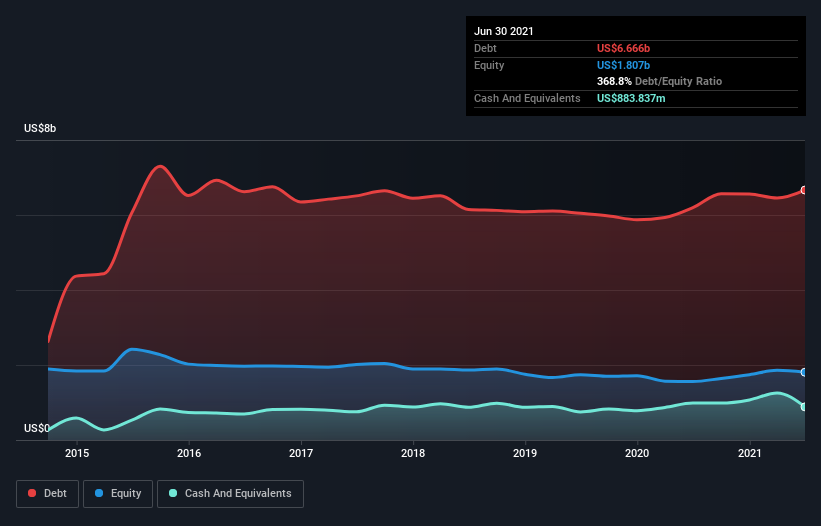- United States
- /
- Renewable Energy
- /
- NasdaqGS:AY
Is Atlantica Sustainable Infrastructure (NASDAQ:AY) Using Too Much Debt?

Some say volatility, rather than debt, is the best way to think about risk as an investor, but Warren Buffett famously said that 'Volatility is far from synonymous with risk.' So it seems the smart money knows that debt - which is usually involved in bankruptcies - is a very important factor, when you assess how risky a company is. We can see that Atlantica Sustainable Infrastructure plc (NASDAQ:AY) does use debt in its business. But the more important question is: how much risk is that debt creating?
Why Does Debt Bring Risk?
Debt and other liabilities become risky for a business when it cannot easily fulfill those obligations, either with free cash flow or by raising capital at an attractive price. Part and parcel of capitalism is the process of 'creative destruction' where failed businesses are mercilessly liquidated by their bankers. However, a more usual (but still expensive) situation is where a company must dilute shareholders at a cheap share price simply to get debt under control. Of course, plenty of companies use debt to fund growth, without any negative consequences. When we think about a company's use of debt, we first look at cash and debt together.
View our latest analysis for Atlantica Sustainable Infrastructure
What Is Atlantica Sustainable Infrastructure's Net Debt?
As you can see below, at the end of June 2021, Atlantica Sustainable Infrastructure had US$6.67b of debt, up from US$6.20b a year ago. Click the image for more detail. However, it does have US$883.8m in cash offsetting this, leading to net debt of about US$5.78b.

A Look At Atlantica Sustainable Infrastructure's Liabilities
We can see from the most recent balance sheet that Atlantica Sustainable Infrastructure had liabilities of US$901.1m falling due within a year, and liabilities of US$7.45b due beyond that. Offsetting this, it had US$883.8m in cash and US$312.2m in receivables that were due within 12 months. So it has liabilities totalling US$7.16b more than its cash and near-term receivables, combined.
The deficiency here weighs heavily on the US$4.12b company itself, as if a child were struggling under the weight of an enormous back-pack full of books, his sports gear, and a trumpet. So we'd watch its balance sheet closely, without a doubt. After all, Atlantica Sustainable Infrastructure would likely require a major re-capitalisation if it had to pay its creditors today.
In order to size up a company's debt relative to its earnings, we calculate its net debt divided by its earnings before interest, tax, depreciation, and amortization (EBITDA) and its earnings before interest and tax (EBIT) divided by its interest expense (its interest cover). This way, we consider both the absolute quantum of the debt, as well as the interest rates paid on it.
Weak interest cover of 1.3 times and a disturbingly high net debt to EBITDA ratio of 7.6 hit our confidence in Atlantica Sustainable Infrastructure like a one-two punch to the gut. This means we'd consider it to have a heavy debt load. More concerning, Atlantica Sustainable Infrastructure saw its EBIT drop by 4.8% in the last twelve months. If that earnings trend continues the company will face an uphill battle to pay off its debt. The balance sheet is clearly the area to focus on when you are analysing debt. But ultimately the future profitability of the business will decide if Atlantica Sustainable Infrastructure can strengthen its balance sheet over time. So if you're focused on the future you can check out this free report showing analyst profit forecasts.
Finally, a business needs free cash flow to pay off debt; accounting profits just don't cut it. So we always check how much of that EBIT is translated into free cash flow. Happily for any shareholders, Atlantica Sustainable Infrastructure actually produced more free cash flow than EBIT over the last three years. That sort of strong cash conversion gets us as excited as the crowd when the beat drops at a Daft Punk concert.
Our View
On the face of it, Atlantica Sustainable Infrastructure's net debt to EBITDA left us tentative about the stock, and its level of total liabilities was no more enticing than the one empty restaurant on the busiest night of the year. But at least it's pretty decent at converting EBIT to free cash flow; that's encouraging. We're quite clear that we consider Atlantica Sustainable Infrastructure to be really rather risky, as a result of its balance sheet health. For this reason we're pretty cautious about the stock, and we think shareholders should keep a close eye on its liquidity. When analysing debt levels, the balance sheet is the obvious place to start. However, not all investment risk resides within the balance sheet - far from it. These risks can be hard to spot. Every company has them, and we've spotted 4 warning signs for Atlantica Sustainable Infrastructure (of which 2 are potentially serious!) you should know about.
If, after all that, you're more interested in a fast growing company with a rock-solid balance sheet, then check out our list of net cash growth stocks without delay.
When trading Atlantica Sustainable Infrastructure or any other investment, use the platform considered by many to be the Professional's Gateway to the Worlds Market, Interactive Brokers. You get the lowest-cost* trading on stocks, options, futures, forex, bonds and funds worldwide from a single integrated account. Promoted
New: Manage All Your Stock Portfolios in One Place
We've created the ultimate portfolio companion for stock investors, and it's free.
• Connect an unlimited number of Portfolios and see your total in one currency
• Be alerted to new Warning Signs or Risks via email or mobile
• Track the Fair Value of your stocks
This article by Simply Wall St is general in nature. We provide commentary based on historical data and analyst forecasts only using an unbiased methodology and our articles are not intended to be financial advice. It does not constitute a recommendation to buy or sell any stock, and does not take account of your objectives, or your financial situation. We aim to bring you long-term focused analysis driven by fundamental data. Note that our analysis may not factor in the latest price-sensitive company announcements or qualitative material. Simply Wall St has no position in any stocks mentioned.
*Interactive Brokers Rated Lowest Cost Broker by StockBrokers.com Annual Online Review 2020
Have feedback on this article? Concerned about the content? Get in touch with us directly. Alternatively, email editorial-team (at) simplywallst.com.
About NasdaqGS:AY
Atlantica Sustainable Infrastructure
Owns, manages, and invests in renewable energy, storage, natural gas and heat, electric transmission lines, and water assets in North America, South America, Europe, the Middle East, and Africa.
Slight with moderate growth potential.
Similar Companies
Market Insights
Community Narratives



